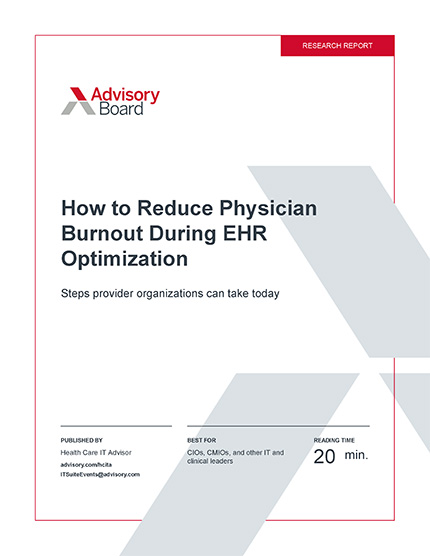Auto logout in seconds.
Continue LogoutRead Advisory Board's take: Why Amazon carefully chose where to deploy this new software
Amazon on Tuesday announced the company is selling new software designed to mine medical data in EHRs to provide physicians and hospitals with information they could use to reduce costs and improve care.
The announcement marks Amazon's latest move into the health care industry, the Wall Street Journal reports.
How natural language processing will help achieve a payback on EHRs
The health care industry's market for analyzing and storing health information is valued at more than $7 billion annually, according to Grand View Research.
About the software
Amazon Web Services is selling the software, which is a language processing service called Comprehend Medical. It is designed to mine unstructured medical data from EHRs to extract information on diagnoses, medical dosages, symptoms, and other health-related details, the Journal reports. The service is compatible with data from all EHRs, and it is HIPPA-compliant because Amazon does not store information extracted from the EHRs.
To use the software, hospitals, providers, and other industry members can upload EHRs to Amazon's cloud service and run the software on the records. The software then searches through the records to identify certain types of data and issues a report on the data "in an organized format, similar to a spreadsheet," the Journal reports.
Amazon said developers trained the software using a process called deep learning, which allows the software to recognize all the different ways a physician could record notes in an EHR. As such, the software can analyze records with medical abbreviations and misspellings.
Matt Wood, general manager of artificial intelligence at Amazon Web Services, said, "We're able to completely, automatically look inside medical language and identify patient details with incredibly high accuracy."
According to the Journal, the software performs as well or better than other tools designed to extract information from unstructured medical data.
Users can also apply analytics from the software to help support clinical decisions, revenue cycle management, and other tasks, Modern Healthcare's "Transformation Hub" reports. For example, researchers at the Fred Hutchinson Cancer Research Center are leveraging Comprehend Medical's capabilities to annotate unstructured clinical records for research databases—which helps researchers more quickly identify patients for clinical trials and determine whether a clinical trial is feasible.
According to the Journal, the software also might help reduce costs for Fred Hutchinson because it automates work that researchers previously completed manually, meaning those researchers are free to complete other assignments.
Wood said the software "tak[es] the process[es] down to seconds." He added, "Reducing that time has a meaningful benefit to providers and insurers. They can spend their research time on more valuable tasks."
Taha Kass-Hout, a senior leader at Amazon focused on health care and artificial intelligence-related initiatives, said, "This is really where a lot of systems are excited about this opportunity … since it can enhance their understanding of the health of individuals and populations" (Evans/Stevens, Wall Street Journal, 11/27; Arndt, "Transformation Hub," Modern Healthcare, 11/27; Baker, "Vitals," Axios, 11/28).
Advisory Board's take

Greg Kuhnen, Senior Director, Health Care IT Advisor
My initial reaction to this announcement from Amazon is that they are a welcome entrant to the field, but will have to face many serious players who are already doing similar work (with a longer track record in health care). Health Fidelity, Optum*, Health Catalyst, IBM Watson, Nuance, MModal, and others have been at this for years.
However, Amazon seems to have carefully selected the domains they want to target with the new software. The domains they named—life sciences and clinical trials recruitment—are two of the easier areas to go after because they feed into a human review process that’s fairly tolerant of false positives. Conversely, natural language processing for clinical decision support and for coding claims are typically much harder because they demand specificity and don’t have as much human oversight. For instance, an algorithm that would have to decode a note like “Patient’s father not immunized for PNA or pertussis” would often trip up naïve engines, due to the classic challenges of decoding abbreviations, negation, and documentation of a family history versus a patient’s history. Instead, Amazon seems to have selected domains where they are likely to face greater success.
Don't miss out on the latest Advisory Board insights
Create your free account to access 1 resource, including the latest research and webinars.
Want access without creating an account?
You have 1 free members-only resource remaining this month.
1 free members-only resources remaining
1 free members-only resources remaining
You've reached your limit of free insights
Become a member to access all of Advisory Board's resources, events, and experts
Never miss out on the latest innovative health care content tailored to you.
Benefits include:
You've reached your limit of free insights
Become a member to access all of Advisory Board's resources, events, and experts
Never miss out on the latest innovative health care content tailored to you.
Benefits include:
This content is available through your Curated Research partnership with Advisory Board. Click on ‘view this resource’ to read the full piece
Email ask@advisory.com to learn more
Click on ‘Become a Member’ to learn about the benefits of a Full-Access partnership with Advisory Board
Never miss out on the latest innovative health care content tailored to you.
Benefits Include:
This is for members only. Learn more.
Click on ‘Become a Member’ to learn about the benefits of a Full-Access partnership with Advisory Board
Never miss out on the latest innovative health care content tailored to you.

